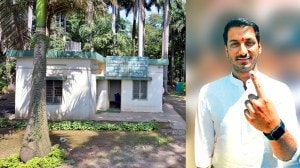Bush seeks $600m to hunt Iraq arms
The Bush administration is seeking more than $600 million from Congress to continue the hunt for conclusive evidence that Saddam Hussein...

The Bush administration is seeking more than $600 million from Congress to continue the hunt for conclusive evidence that Saddam Hussein’s government had an illegal weapons program, officials said on Wednesday.
The money, part of the White House’s request for $87 billion in supplemental spending on Iraq, comes on top of at least $300 million that has already been spent on the weapons search, the officials said.
|
Three US soldiers killed in fresh attacks across Iraq Story continues below this ad
Governing Council preparing war crimes panel |
The budget figures for the weapons search are included in the classified portion of the administration’s supplemental appropriations request, and have not been made public. The size of the administration request suggests the White House is determined to keep searching for unconventional weapons or evidence that they were being developed under Saddam.
The search so far has turned up no solid evidence that Iraq had chemical, biological or nuclear weapons when the American invasion began in March, according to administration officials. Counting the money already spent, the total price tag for the search will approach $1 billion.
The money is designed specifically to fund the activities of the Iraq Survey Group, made up of teams of troops and experts who are managed by Pentagon but whose activities are coordinated by David Kay, a former UN weapons inspector who reports to the CIA director, George Tenet.
Officials said that the money for the Iraq Survey Group comes under the classified intelligence portion of the Pentagon’s budget request. A Pentagon spokesman declined to comment on the classified category.
The request for increased funding comes just as Kay is scheduled to brief Congress in closed sessions on Thursday on an interim report of the Iraq Survey Group’s findings so far.
He is to testify before the House Permanent Select Committee on Intelligence, and the Senate Select Committee on Intelligence. The CIA is expected to publicly release a statement based on Kay’s testimony after the briefings, officials said.
The CIA officials said last week that Kay’s report would be inconclusive, suggesting that he will not report that he has found strong evidence of the existence of illegal weapons in Iraq.
Officials familiar with the budget request said if the administration gets the amount of money it is requesting, it will provide funding for a staff of 1,400 for the Iraq Survey Group. It currently has more than 1,200 members.
The cash infusion is being sought even though the group has gotten off to what experts and military officials said has been a rocky start. Though a larger group than the 75th Exploitation Task Force, the military weapons hunting group that preceded it, many members of the Iraq Survey Group were drawn from reserve units.
Some weapons hunting units have sat in Baghdad for days, sometimes weeks, waiting for missions, officials say. ‘‘Even when hot tips have come in, it often takes days to mobilise a unit to visit a suspect site or talk to a suspect scientist,’’ said a former member of one unit.
The Iraq Survey Group has also been slow to mobilise former international weapons inspectors who had volunteered to accompany both the Exploitation Task Force and the Iraq Survey Group, those inspectors say.
‘‘Most of us have just given up waiting and gone on with our lives,’’ said one former weapons inspector who was told he would be sent to Baghdad. The group has also concentrated on installing an unnecessarily elaborate, expensive infrastructure to support its operations, said several military officials who complained there was a disparity between the resources allotted to the two programs.
While the Exploitation Task Force worked out of an abandoned palace and the servants’ housing quarters near Baghdad airport and remained short of vehicles, air support, computers, and even electricity during the initial months of the weapons hunt, the Iraq Survey Group spent its first weeks installing air-conditioned trailers, a new dining facility, state-of-the-art software, and even a sprinkler system for a new lawn, according to officials and experts who worked with the group this past summer.
‘‘They kept unloading crates and crates of new Dell laptops,’’ said a Pentagon official who complained that the exploitation force lacked resources. — NYT



- 01
- 02
- 03
- 04
- 05




























